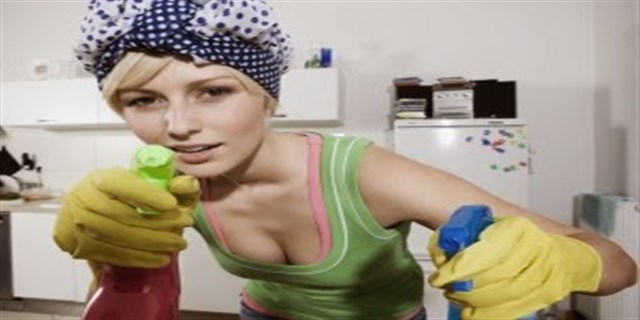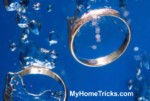Cleaning Metals
You must know how to do cleaning metals at home. Because, the metal objects in our houses can gradually darken over time, lose their brightness. These metal items can be various household items, valuable table-wares, metal accessories, furniture and various kinds of jewelry.
Tips for Cleaning Metals
There are some methods we can apply to clean and restore these metal objects. Now, according to the type of metal objects, let’s examine the methods for cleaning metals and metal objects how we can restore them to their original state.
Cleaning Metals: Chrome And Stainless Steel
It is important not to use abrasive cleaners on chrome since the plating can be damaged easily. To treat corrosion, use a special chrome cleaner.
Although stainless steel is easy to care for, it can become stained by deposits from hard water, grease splashes, and silver cleaner.
Cleaning Metals: Chrome
• Minor marks: Remove these by wiping over with a little dishwashing liquid and water.
• Shining faucets: For a quick shine, rub a handful of plain flour on faucets, then polish with a soft cloth.
Cleaning Chrome
Gently clean chrome with white vinegar. Remove stubborn marks with a solution of baking soda and warm water. Rinse.
Stainless Steel
General care: Dry stainless steel thoroughly after washing, to prevent a buildup of white film. Do not soak stainless steel – it may become pitted. To shine stainless steel, use a commercial cleaner, or one of the methods below.
Shining Stainless Steel
Give stainless-steel pans a good shine by rubbing with flour. Remove heat marks with a scouring pad and lemon juice.
Cleaning Metals: For Knives
• Removing smells: If strong fish or garlic smells cling to a knife blade, plunge it into the soil. Wash well before use.
• Keeping knives sharp: Store knives in a wooden knife block, or on a magnetic rack. If you store them with other utensils, the blades will become blunt – and you may cut yourself when reaching into drawers. Alternatively, keep knives in plastic sleeves or in fabric rolls (available at restaurant-supply stores).
Cleaning Metals: Iron And Pewter
Cast iron must always be dried thoroughly after being washed; otherwise, it will rust. Season it well with cooking oil before use. Pewter should have a soft glow rather than a shine. Wash it in soapy water, and buff well. Remove grease marks with denatured alcohol.
Caring For Cast Iron
After washing and drying cast- iron pans, rub with vegetable oil. If the pans are rusty, rub them with 1 tbsp (15 ml) citric acid and 2 cups (600 ml) water.
Removing Wax
To remove wax from pewter candlesticks, place them in the freezer, and the wax will chip off. Use a hair dryer on low to melt away any remaining traces.
Cleaning Metals: A Traditional Tip
• Cleaning pewter: Rub pewter objects with cabbage leaves, or immerse them in leftover water that has been used to boil eggs.
Cleaning Metals: Brass and Copper
Use the same methods to clean brass and copper. Apply a thin layer of lacquer to the surface of these metals to reduce the need for polishing. Use a cardboard template when cleaning brass and copper details on furniture, so that no metal polish spills onto the wood.
Cleaning Brass and Copper
Removing tarnish Use a paste of salt and lemon juice, or rub items with half a cut lemon dipped in salt. Rinse.
Removing Verdigris
If brass or copper turns green, rub with a solution of ammonia and salt. Always wear gloves when using ammonia.
Cleaning Metals: Caring for Bronze
Copper pans Have copper pans relined when the interior starts to show signs of wear. Copper reacts with food acids.
Cleaning Ashtrays
After washing a brass or copper ashtray, spray a little wax polish on the inside. In the future, you will be able to wipe it out easily.
Shilling Bronze
Wipe bronze objects with a little. Shoe polish or vegetable oil to maintain a sheen. Cleaning Dust bronze with a soft cloth. Clean intricate areas with a cotton swab. Apply turpentine to remove any marks, then polish.
Cleaning Metals: Other Metals
Precious metals, such as gold and platinum, are most commonly found in the home in the form of jewelry. Protect gold jewelry by storing it separately. Gold leaf is sometimes used on picture frames it needs to be handled with care to prevent it from coming off.
Caring For Gold
Gold chains Wash in a bowl of soapy water. Use a soft toothbrush to get inside links. Drip dry on a towel; then rub with chamois leather.
Storing Gold Jewelry
Wrap clean gold jewelry in chamois leather to maintain brightness. Wash gold jewelry occasionally in soapy water.
Large Gold Items
• Cleaning: Clean large gold objects such as goblets and plates with an impregnated cloth for silver cleaning. Buff with a chamois leather.
Replacing Gold Leaf
If a modern gilt frame becomes damaged, use gilt paint, available from art suppliers, to touch up marks. (Gilt paint is poisonous.)
Cleaning Other Metals
• Platinum: Clean platinum by immersing it for a few minutes in a jewelry dip. Use a soft toothbrush for intricate areas. Rinse and dry it thoroughly.
• Lead: Scrub with turpentine. Place very dirty objects for approximately five minutes in a solution of one part white vinegar to nine parts water, with a little baking soda added. Rinse in distilled water.
• Ormolu: Clean by making a solution of 2 tsp (10 ml) ammonia in a cup of warm water. Apply the solution to the object with a cotton swab. Rinse with clear water on a cotton ball, and dry with a soft cloth. Do not use metal polish on any ormolu.
Tip: Here, we looked at some examples of Cleaning Metals. We have just discussed the simplest solutions. For more information about “how to clean rust off metal”, click on the “tags” below.





